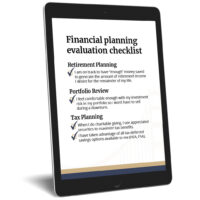
The One Big Beautiful Bill Act (OBBBA) – Tax law changes you need to know
Recent legislation under the One Big Beautiful Bill Act (OBBBA) includes a wide range of tax law changes that will affect individuals, families, and business owners—especially those with higher incomes. Understanding the effective dates is critical, as some provisions start now or in 2026, while many are set to expire by 2028.
This summary highlights the changes most likely to impact clients of The Advisory Group. If you have questions about how these updates apply to your specific situation, please don’t hesitate to reach out.
Highlights from the OBBBA
- The income tax brackets and rates currently in place are going to continue rather than sunset, with some exceptions at the lower end. Effective rates go down for all taxpayers as a result.
- The estate and gift tax exemption will be raised to $15 million starting in 2026 ($30 million per couple), and it will be adjusted for inflation beginning the following year.
- The Tax Cuts and Jobs Act (TCJA) of 2017 imposed a cap on the amount of State and Local Taxes (SALT) that could be deducted on your federal return. Under the new law:
- The SALT deduction increases to $40,000 starting in 2025.
- However, for Married Filing Jointly taxpayers with AGI over $500,000, the deduction remains capped at $10,000.
Things That Require Action in 2025
Green Energy Credits Set to Expire
Some of the “green energy” credits are going away this year:
- If you plan to purchase an electric vehicle and want to use the applicable credit, you must do so by September 30, 2025.
- Certain residential green energy credits will expire on December 31, 2025.
- There’s also a credit of up to $1,000 available for installing electric vehicle charging equipment, but you must have that in place by June 30, 2026.
New Deduction for Taxpayers Age 65+
There is a new $6,000 deduction per taxpayer over age 65, available for tax years 2025 through 2028. This has sometimes been mistakenly described as a “no tax on Social Security” change, which it is not.
- This deduction is available regardless of whether you take the standard or itemized deduction.
- It does not affect your Medicare bracket, nor does it change whether or not your Social Security income is taxed.
- The deduction phases out completely for:
- Single taxpayers with AGI over $175,000
- Married Filing Jointly taxpayers with AGI over $250,000
New Vehicle Loan Interest Deduction
Starting now and through 2026, you may deduct up to $10,000 of interest on a new vehicle loan—provided that the vehicle meets the requirement of being “finally assembled” in the United States.
- This deduction phases out for:
- Single filers with AGI over $100,000
- Married Filing Jointly with AGI over $200,000
- Importantly, you can take this deduction whether or not you itemize.
Charitable Giving Opportunities in 2025
If you plan to itemize your deductions and make large charitable contributions, they will be more valuable in 2025 than in 2026.
- Beginning in 2026, there will be a 0.5% AGI floor on charitable deductions.
- For this reason, 2025 may be an ideal year to “bunch” charitable contributions or fund a donor-advised fund, especially if you anticipate higher income.
Home Loan Interest
- The interest deduction on home loans is now permanently limited to $750,000 of mortgage indebtedness.
- Home Equity Line of Credit (HELOC) interest is not deductible, unless the amount borrowed is used to build or improve property.
New Accounts for Children (2025–2028 Birth Years)
There are new savings accounts for children that can include a $1,000 initial deposit from the U.S. government for babies born between 2025 and 2028. However, these accounts may not offer meaningful advantages over existing savings vehicles such as 529 plans or custodial accounts. Please contact us to evaluate how these accounts fit into your broader savings and education strategy.
SALT Phaseouts and Higher Marginal Rates for Some
For taxpayers with income between $500,000 and $600,000, the marginal rate could reach 45.5% due to the SALT deduction phaseout.
- If this applies to you, it may be very worthwhile to explore ways to reduce your AGI, such as through charitable contributions.
- Business owners may still be able to benefit from a pass-through entity deduction—we’re happy to walk through options with you.
Timing Considerations for Incentive Stock Options (ISOs)
If you’re holding Incentive Stock Options (ISOs), it’s worth reviewing whether exercising them in 2025—rather than in 2026—may be more advantageous due to changes in the Alternative Minimum Tax (AMT) calculation (see more below).
Tax Changes to Watch for in 2026
Additional Charitable Deduction for Standard Filers
Starting in 2026, there will be a new charitable deduction available even for taxpayers who take the standard deduction.
- The deduction will be:
- $1,000 for Single or Head of Household filers
- $2,000 for Married Filing Jointly
- You’ll need to save receipts for all cash donations, even if you don’t itemize.
Return of the Alternative Minimum Tax (AMT)
The 2017 TCJA greatly reduced the number of taxpayers subject to the Alternative Minimum Tax. Under the new OBBBA rules:
- The AMT exemption phaseout thresholds have been lowered, and the phaseout rate is increasing.
- This means more people—especially those with Incentive Stock Options (ISOs) or significant preference items—may need to start calculating AMT again.
- If you think you could be subject to AMT in 2026, exercising ISOs in 2025 might be a better strategy.
Other Tax Topics That May Be Relevant
Depending on your situation, the following changes may also apply. Please reach out to your tax professional or to your Advisory Group team if any of these raise questions:
- Professional gambling losses (changes starting in 2026)
- Tip deduction of up to $25,000 (available in 2025)
- Expanded 529 Plan uses, including:
- Tutoring services
- Therapies for students with disabilities
- Standardized test fees
- Tuition, books, and courses for professional credentials
- Mortgage insurance deductibility
- Casualty loss deductions for federally declared disaster areas
- Child tax credit changes, including phaseouts
- Saver’s credit and 529 rollovers to ABLE accounts
- Section 199A QBI deduction has been made permanent for business owners
- ISOs and AMT planning: As noted above, exercising in 2025 may help avoid AMT exposure in 2026
Let’s Plan Ahead Together
The OBBBA brings sweeping changes that offer opportunities as well as planning challenges. As always, we’re here to help you think strategically and act in a timely way.
If you’d like to review how these provisions apply to you or your family, please reach out to your financial advisor. We’re happy to collaborate with your tax professional to ensure your strategy is optimized for the years ahead.
The information provided herein is for informative and educational purposes only. The use of hyperlinks to third party websites is not an endorsement of the third party. Third party content has not been independently verified. To understand how this content may apply to you, please contact a financial advisor.






